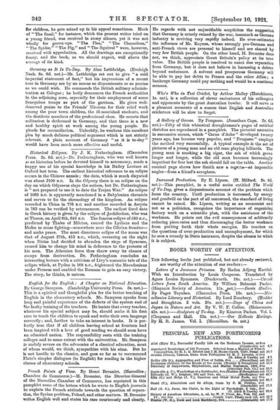Historical Eclipses. By J. K. Fotheringham. (Clarendon Press. 2s. 6d.
net.)—Dr. Fotheringham, who was well known as an historian before he devoted himself to astronomy, made a happy use of his special knowledge in his Halley Lecture at Oxford last term. The earliest historical reference to an eclipse occurs in the Chinese annals ; the date, which is much disputed was about 2100 B.C. In the Odyseey there is an eclipse on the day on which Odysseus slays the suitors, but Dr. Fotheringham is " not prepared to use it to date the Trojan War." An eclipse of 1063 B.C. is apparently mentioned in a Babylonian chronicle and serves to fix the chronology of the kingdom. An eclipse recorded in China in 776 B.o. and another recorded in Assyria in 763 can be verified by astronomers. The earliest fixed date in Greek history is given by the eclipse of Archilochus, who was at 'Theses, on April 6th, 648 B.o. The famous-eclipse of 585 B.o., predicted by Tholes of Miletus, caused the Lydian and the Medea to cease fighting—somewhere near the Cilician frontier— and make peace. The most disastrous eclipse of the moon was that of August 27th, 413 B.o., which, occurring on the night when Nicias had decided to abandon the siege of •Syracuse, caused him to change his mind in deference to the protests of his men. The Athenian force thus threw away its chance of escape from destruction. Dr. Fo heringham concludes an interesting lecture with a criticism of Livy's romantic tale of the eclipse which, at Pydna in 168 B.o., frightened the Macedonians under Perseus and enabled the Romans to gain an easy victory. The story, he thinks, is untrue.


































 Previous page
Previous page